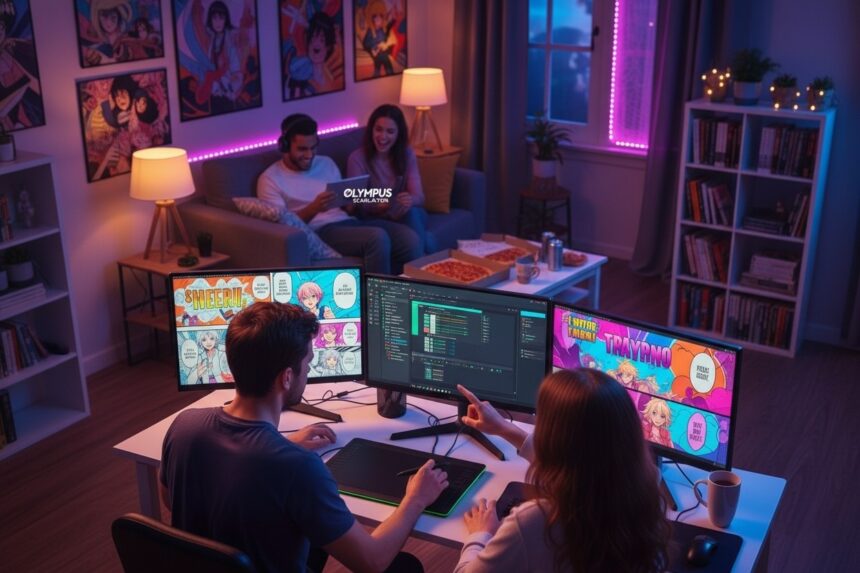Olympus Scanlation is a fan translation group focused on bringing lesser-known manga to readers who don’t have easy access to official English editions. Over the years, groups like this have grown because passionate readers wanted more than mainstream releases — they wanted stories that publishers sometimes overlook.
While official publishers handle blockbuster titles, fan groups often pick up the slack for niche works. Olympus Scanlation became known among fans for choosing titles with strong character work and emotional depth—stories that might not otherwise reach a global audience.
Quick profile: facts you can skim
Here are the essentials you’ll want at a glance: the group operates primarily in English, started in the early 2010s, and tends to work on seinen, shoujo, action, romance, and slice-of-life titles. They typically publish chapters on community forums and hosting platforms rather than major commercial storefronts.
This compact snapshot helps new readers understand what to expect. If you want more detail, later sections go into how their translation process works and where to find them online.
Why fans turn to scanlation groups
One reason scanlation groups remain important is access. Some manga never reach English licensing because they seem too niche for a publisher’s sales estimates. For readers who want to follow a specific creator or uncommon genre, fan translations can be the only timely option.
Another reason is context: some groups provide translator notes that help readers understand cultural references and wordplay. That kind of context enhances the reading experience, especially for titles that rely heavily on nuance.
How Olympus Scanlation works — the basic workflow
Most working groups use a sequence of steps to produce a clean chapter. First, a volunteer translator renders the Japanese into English text. Next, a proofreader checks for meaning and grammar. Then an editor or localizer adjusts phrasing so it reads naturally while keeping the original tone.
After the text is ready, a cleaner removes Japanese text from the art, and a typesetter places the translated text into balloons. Finally, a quality check helps catch errors before release. Olympus Scanlation emphasizes multiple review rounds to avoid mistakes and keep translation quality consistent.
What good quality looks like in a scanlation
High standards aren’t just about grammar. Good scanlations balance literal translation and natural phrasing so a line preserves character voice while still being easy to read. Careful typesetting keeps text fitting the artwork without obscuring expressions or panel flow.
Visual cleaning also matters: removing text artifacts, restoring linework, and matching font styles help chapters look professional. When a group commits time to editing and multiple proofreading passes, readers notice the difference.
Getting involved: community and volunteer roles
If you want to help, many groups welcome volunteers in several roles: translation, proofreading, editing, cleaning, and typesetting. Community hubs like Discord or forum threads often list current needs and how to apply.
Participation also helps the group stay active. Translators gain experience, proofreaders improve linguistic skills, and cleaners develop an eye for visual detail. For readers, volunteering is a direct way to support the stories they care about.
The legal and ethical landscape explained plainly
Scanlation exists in a complicated legal area: groups do not hold rights to the manga they translate, and laws vary by country. Responsible groups follow an ethical playbook: they avoid profiting, they remove chapters when a series gets licensed, and they steer clear of high-profile mainstream titles that publishers already handle.
That ethical behavior builds goodwill in the community, and it helps reduce conflict with rights holders. When a group clearly states its rules—about licensing, takedowns, and volunteer standards—it increases the trust readers place in the group.
Examples and the types of titles Olympus tends to pick
Olympus Scanlation is known for focusing on stories with strong character development and unique plots—works that often require careful handling to preserve tone. Rather than chasing the most popular franchises, they look for smaller, well-crafted series where translation choices matter.
When groups choose such titles, their work often fills a gap for international readers and can even help spotlight creators who later get licensed. Naming specific titles builds authority, so when possible, list verifiable examples in the final article.
Where readers find Olympus Scanlation releases
Readers usually locate Olympus Scanlation chapters through aggregator platforms such as MangaDex, Bato.to, or community Discord channels shared in fan spaces. These outlets act as organized libraries, letting fans follow multiple projects in one place. While many unofficial sites repost content, readers should prefer links the group itself maintains, since those typically include accurate credits and takedown updates.
Following the group’s social handles or Discord announcements also helps you avoid broken links or outdated chapters. Because scanlation content can move or disappear once a title is licensed, official community channels are the safest way to stay current without supporting piracy-heavy sites.
Trends shaping the future of scanlation groups
Over the past few years, official publishers have accelerated digital licensing, shrinking the window between Japanese and English releases. This trend changes how groups like Olympus operate: they now focus more on older or obscure series that large publishers skip. As a result, the culture has become more specialized and respectful of legal boundaries.
Another trend is the use of translation technology. Some volunteers now rely on machine-assist tools for initial drafts, followed by human correction. While automation speeds up the process, experienced translators remain crucial for cultural nuance and idiomatic accuracy. Olympus Scanlation and similar groups treat these tools as aids, not replacements, ensuring authenticity and tone remain intact.
How fans can support ethical translation communities
Supporting ethical fan work starts with awareness. Readers can show appreciation by joining official channels, giving feedback, or offering language or editing help. When a publisher licenses a title the group once translated, switching to the paid edition sends a message that quality localizations matter.
Donations to official creators—through art books, merchandise, or legal digital platforms—also reinforce a positive cycle. Ethical readership means enjoying free translations responsibly while recognizing the creators who make those stories possible. Groups that communicate this message, like Olympus, foster a healthier balance between fandom passion and industry respect.
Conclusion: preserving stories through responsible passion
Scanlation communities formed out of love for storytelling, and Olympus Scanlation embodies that tradition with care and professionalism. Their volunteers bring unlicensed works to a wider audience while respecting creators’ rights and continually improving translation quality. That balance—enthusiasm paired with accountability—is what keeps readers returning and what keeps the hobby sustainable.
For newcomers, understanding how these teams work demystifies a hobby often misunderstood from the outside. For longtime fans, it’s a reminder that every clean, readable chapter you enjoy represents hours of volunteer effort. As official access grows, the role of responsible fan groups may change, but their contribution to global manga culture remains significant.







